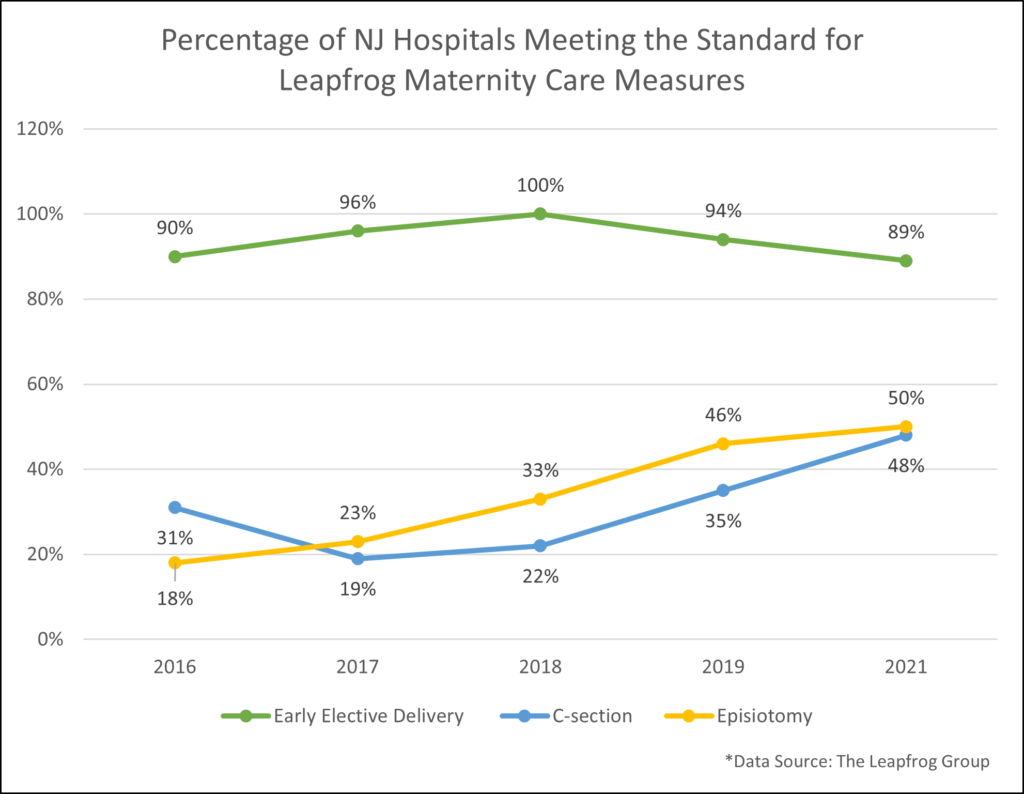Five years ago, the Quality Institute, in partnership with many of our members, increased our focus on Maternal Infant Health. We were driven by our concern over New Jersey’s high rate of Caesarean section deliveries, high rate of maternal morbidity and mortality, and the disparities based on race. Since then, much has changed, and I am happy to share with you some of the tangible progress being made in our state to improve health care for pregnant individuals and infants.
We’ve experienced a culture change, including greater awareness that something was wrong. Five years ago, in boardrooms and government meetings across the state, providers and health care leaders regularly blamed rising C-section rates of low-risk, first time mothers on aging mothers and patient preference. Disparities in outcomes were pinned on so-called noncompliant patients. Today, evidence, now widely accepted, shows the greatest determinant of whether individuals have C-sections is where they give birth. Moreover, we acknowledge the importance of respectful care — and we accept that racial bias exists and causes great harm to mothers and babies of color. These cultural changes are fundamental to the continued success of our collective work to improve maternal infant health.
Another critical change is funding. As a State, we are now funding perinatal care for more pregnant individuals than ever, and we are providing care that is more comprehensive. Two examples are: funding to support both pregnancy care and contraceptive care for low-income women regardless of immigration status; and funding post-partum care through Medicaid for one year rather than 60 days. Funding pre-natal care and contraceptive care makes economic sense and leads to healthier pregnancies. Funding post-partum care saves lives. We know that maternal health crises can take place weeks or months after the birth of a child so expanding this coverage is also necessary to reduce maternal mortality. Providing health care for new mothers also can support the critical first year of a baby’s life. The funding is in the budget and the State is now awaiting federal approval.
Addressing the health disparities in maternal infant care is also receiving much needed attention and support. The current State budget includes $450,000 to fund a registry of State-certified doulas, which consumers can consult as a resource, and the State Department of Health recently awarded a grant to an organization to create a learning collaborative to strengthen and expand a diverse, community doula workforce. This work is a key part of First Lady Tammy Murphy’s Nurture NJ strategic plan to make New Jersey the healthiest place to give birth.
Another contributing factor to the progress we are seeing is a focused commitment at birthing hospitals to improve birth outcomes. Their commitment to collecting, reviewing, and reporting their quality data as well as participating in quality improvement activities has been essential to the progress we are now seeing.
Indeed, from 2016 to 2021, the number of New Jersey hospitals that have met the core Leapfrog Hospital Survey Maternity Measures has significantly improved on C-section rates and rate of episiotomies and was about the same on early elective deliveries.
The formidable combination of culture change, public investment, addressing disparities, and quality improvement is making a difference.
As always, I am eager to hear from you about the work you are doing and how the Quality Institute can support your efforts. I also hope you will read our Take Five Interview with Dr. Margaret Fisher about her work at the New Jersey Department of Health deploying Community Ambassadors to get as many people as possible vaccinated to combat COVID-19.


